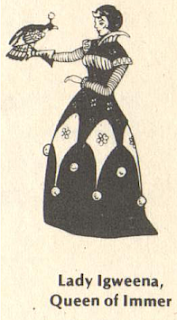Muetar is the largest kingdom of Minaria in land area and possessed of the largest army. Its rulers are the descendants of the Mueta horse lords who first harried the city-states of the Land of the Great Rivers, then were its foederates, until a chieftain general Oyaro (Old Meuta: Hoyaru), forced the Princes of Methluma to give him the title of Supreme General or Warlord. The word, as borrowed into the Muetarian tongue, eventually came to mean "emperor." Oyaro's line came to be the de facto rulers of the land in a military dictatorship that developed over generations into the current feudal state.
Friday, October 22, 2021
Minaria: Muetar
Muetar is the largest kingdom of Minaria in land area and possessed of the largest army. Its rulers are the descendants of the Mueta horse lords who first harried the city-states of the Land of the Great Rivers, then were its foederates, until a chieftain general Oyaro (Old Meuta: Hoyaru), forced the Princes of Methluma to give him the title of Supreme General or Warlord. The word, as borrowed into the Muetarian tongue, eventually came to mean "emperor." Oyaro's line came to be the de facto rulers of the land in a military dictatorship that developed over generations into the current feudal state.
Sunday, October 10, 2021
Minaria: Immer
Monday, October 4, 2021
Minaria: Half-Elves
In my post about the elves of Neuth last week I neglected to discuss the Ercii or Half-elves. The name comes from a contraction of the Elvish term for "mixed blood." Half-elves have faced persecution within the forest of Neuth, alternately being expelled or limited in terms of their movements and activities.
Some Ercii, however, do perform an important function within Elven society, and members of that select group have even managed to prosper. Elven nobility finds direct engagement with financial matters beneath their station. Unwilling however, to leave these matters strictly to elves or lower station, have brought on individual Ercii or sometimes groups of them as factors or bookkeepers. Some of these have become prosperous enough to be able to act independently acted as moneylenders to other noble houses.
The Elvish Crown has also employed Ercii as ambassadors or diplomats to other lands or and allows them to operate as money changers (so long as the Crown gets its share of the profits). Some of the these Ercii have not only become wealthy but able to wield (discretely) a great deal of political power. Perhaps some times more power than the Elves know, as they are the conduit through which the kingdom interacts with the outside world.
Still, their status as second class citizens is something they are unlikely to forget. Many Ercii in service to Elven nobles were taken from their families as infants and raised as servants to the noble house. More than one has had their fortune seized by a covetous noble who claimed it was their due. Others have lost their lives for their effrontery of being a noble's creditor.
Friday, October 1, 2021
Minaria: Elfland
This is the first post in a series, perhaps. My version of Minaria, extrapolated from the map, manuals, and pieces of the boardgame, Divine Right.
Humans are not welcome in the shadowed and quiet forests of Elfland. This antipathy is ancient. In the age following the fall of the Lloroi Empire, the Elves of Neuth (as they call the great forest in their own language) viewed the primitive tribes that they encountered as they ventured from their home as little more than clever beasts. The years have taught them that those beasts can be dangerous; they have learned to be wary of humans, but not to respect them.
The Elves believe themselves to the heirs to the Lloroi, possibly even a direct continuation of that great race. They take pride in being the only culture to withstand the Cataclysm without a reversion to barbarism. They prefer not to discuss the crumbling spires of their half-buried, ancient capital of Letho or the much reduced extent of their lands.
The Great Forest is relatively unspoiled by human standards. Their craft and science (they do not call it magic) is such that their communities often blend into their surroundings. Only another elf might know that they were there.
Humans who have dared to enter the forest easily become lost and often have returned with their memories completely gone. Those are the ones that return at all. Elven rangers patrol the wood with hounds whose howls are uncannily like human voices in lamentation and whose all too human faces hold horror in their eyes. Few elven settlements would give shelter to human stranger, raised as every elf is on tales of the malice of the beast Man.
"One day," say the elven lords to their knights when they are feasting in their hidden halls. "One day our host will ride forth and scatter the human rabble before us."












